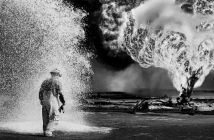
Cast: Sandra Bullock, Melissa McCarthy, Demián Bichir
Director: Paul Feig
Country: USA
Genre: Action | Comedy | Crime
Official Trailer: Here
Editor Notes: The Heat is now open in wide release. For an affitional perspective on the film, see Derek’s review.
Two years removed from Bridesmaids, one of the richest, funniest studio comedies of this decade, comes The Heat, boasting directly half of the former film’s pedigree. Director Paul Feig chose this film as his follow-up to the 2011 smash, or maybe it chose him; after all, the guy is now seen as the Patron Saint of Successful Female-Centered Comedies. But lest we forget, the auteurs of Bridesmaids were Kristen Wiig and Annie Mumulo, whose screenplay was the driving force of the film’s success. Feig just got out of the way and let the script sing. He largely stays out of the way here, too, allowing Katie Dippold’s script to flex. Problem is, this script has fewer muscles to flex, which means it can’t as thoroughly exercise the funny bone. Sorry for the pun… though it is about on the subpar level of this film’s weaker jokes.
They are funny in the movie because they are great comedic talents… not necessarily because the script gives them a boatload of funny material to work with.
 Even though The Heat boasts not one but two Bridemaids alums—the second being none other than Oscar nominee Melissa McCarthy—any comparison between the two films is unfair. The Heat is not a sequel… not even a psychic, tonal, or stylistic one… but its own film that, honestly, occupies unique air in the cinesphere. It’s a female-centered buddy cop movie, which has never been a thing before. There have been plenty of female buddy movies over the years, but The Heat is the first buddy cop film to literally castrate the sub-genre, adopting the tropes but usurping the traditional male-centered power roles at every turn. In that way, the movie is a groundbreaker… and that almost makes up for the fact that it’s hit-or-miss in the comedy department.
Even though The Heat boasts not one but two Bridemaids alums—the second being none other than Oscar nominee Melissa McCarthy—any comparison between the two films is unfair. The Heat is not a sequel… not even a psychic, tonal, or stylistic one… but its own film that, honestly, occupies unique air in the cinesphere. It’s a female-centered buddy cop movie, which has never been a thing before. There have been plenty of female buddy movies over the years, but The Heat is the first buddy cop film to literally castrate the sub-genre, adopting the tropes but usurping the traditional male-centered power roles at every turn. In that way, the movie is a groundbreaker… and that almost makes up for the fact that it’s hit-or-miss in the comedy department.
McCarthy and Sandra Bullock are game for the Odd Couple treatment, and they are terrific choices for the straight-laced FBI dynamo (Bullock) and the rowdy renegade Boston cop (McCarthy) forced together to take down a notorious drug lord. They are funny in the movie because they are great comedic talents… not necessarily because the script gives them a boatload of funny material to work with. Like nearly every recent comedy, The Heat was modeled in the Apatow mold of using the script to merely frame each situation and then letting the actors loose to improvise their way to comedic gold. It’s almost foolproof, since talented people are always able to feel their way to the funny. I say “almost” because, even when used as framework, the script still needs to facilitate the gravity of the story. What elevated Bridesmaids—or This Is 40, or Superbad, or any other highpoints of the Apatow-inspired era—was the emotion lying just beneath the comedy, enriching the characters, thereby making their situations even funnier. There are valid attempts at character development here—primarily involving the loneliness of the two central women—but they are all lost in the mechanisms of this crime lord plot, which unfortunately is the only standard formulaic element the filmmakers chose not to tweak.
So rather than getting out of the way of the script, perhaps Feig should’ve asserted himself a little more. There was more shaping required for this screenplay.
 What results is a would-be laugh-out-loud comedy that delivers only a couple of those gut-busting moments, with a handful of chuckles and a few bemused smiles. The rest of it falls flat. The comedic rhythm improves as the film progresses, which is no surprise, since The Heat is the kind of comedy that is totally dependent upon chemistry and timing. Because Bullock and McCarthy spend the first thirty minutes apart, developing thin back stories rather than building comedic momentum together, the comedy doesn’t get rolling until about an hour in. Once the stars are cut loose and the laughs finally start flowing, the film barrels its way to the conclusion. So rather than getting out of the way of the script, perhaps Feig should’ve asserted himself a little more. There was more shaping required for this screenplay. Bullock and McCarthy are great together, but there’s not enough of it, and it’s not enough to make this a great comedy. It’s a shame, too, because The Heat’s position in this genre is somewhat revolutionary. How unfortunate that the film itself doesn’t match its place in history.
What results is a would-be laugh-out-loud comedy that delivers only a couple of those gut-busting moments, with a handful of chuckles and a few bemused smiles. The rest of it falls flat. The comedic rhythm improves as the film progresses, which is no surprise, since The Heat is the kind of comedy that is totally dependent upon chemistry and timing. Because Bullock and McCarthy spend the first thirty minutes apart, developing thin back stories rather than building comedic momentum together, the comedy doesn’t get rolling until about an hour in. Once the stars are cut loose and the laughs finally start flowing, the film barrels its way to the conclusion. So rather than getting out of the way of the script, perhaps Feig should’ve asserted himself a little more. There was more shaping required for this screenplay. Bullock and McCarthy are great together, but there’s not enough of it, and it’s not enough to make this a great comedy. It’s a shame, too, because The Heat’s position in this genre is somewhat revolutionary. How unfortunate that the film itself doesn’t match its place in history.
[notification type=”star”]49/100 ~ BAD. The Heat is revolutionary in the buddy cop subgenre, but hit-or-miss in the comedy department.[/notification]



